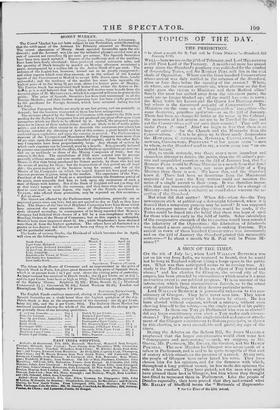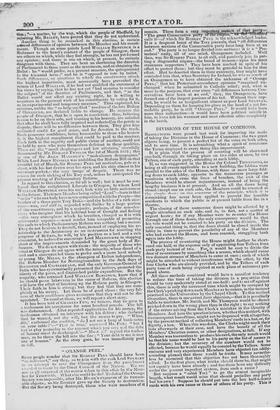A SIGN OF THE TIMES.
ON the 4th of July last, when Lord WILLIAM BENT1NCK was yet on his way from India, we ventured to foretel, that he would. not be long in England without filling a large space in the public eye. What was then anticipated seems to be cooling true. Al- ready is the Ex-Governor of India an object of Tory hatred and abuse; * and his election for Glasgow, the second city of the empire, has been attended by circumstances which render it a most instructive event in our political progress. It is on account of the information which those circumstances furnish, as to the actual state of political feeling, that they deserve particular notice.
Lord WILLIAM BENTINCK is personally unknown to the con- stituency of Glasgow. They have never seen him. They know nothing about 1,i— except what is km,. by others. IIC has been elected without expense, without a canvass, without even showing himself to the voters,—on the single ground of his public character. Is there one Tory ,in Parliament who was so elected? did any large constituency ever elect a Tory under such circum- stances? The public-spirit, the single-minded and earnest attach- ment of the Glasgow constituency to Reform prinriples, as shown by this election, is a most remarkable and gratifying sign of the times.
During the debates on the Reform Bill, Sir JOHN MALCOLM prophesied that the larger constituencies would elect none but " demagogues and mob-orators," — such, we suppose, as Mr. GROTE, Mr. PATTESON, Mr. EWART, the Speaker, and Sir HENRY PARNELL. The new Member for Glasgow was never much of a talker in Parliament, and is said to be quite incapable of that sort of oratory which stimulates the passions of a crowd. At any rate, the people of Glasgow have never heard his voice. They have chosen him for his opinions, and for the firmness with which, throughout a long political career, he has made .his opinions the rule of his conduct. They have picked, not the man who might have pleased them best in Glasgow, but him whom they thought best fitted to represent them in Parliament. Like the people of Dundee especially, they have proved that they understand what Mr. BAILEY of Sheffield terms the " Rationale of Reprcsenta- • Sec toe Times of the 13th 'agent. tie- matter, by the way, which the people of Sheffield, by
Rejecting Mr. BAILEY, have proved that they do not understand. Another thing to be remarked in this election, is certain avowed differences of opinion between the Member and his consti- tuents. Though on some points Lord WILLIAM BENTINCK is a Reformer to the heart's content of the people of Glasgow, there
are others on which, while they feel strongly, he has not yet formed any opinion; and there is one on which, at present, he entirely
disagrees with them. They are bent on shortening the duration of Parliament to three years as the maximum, and on obtaining the Ballot : be " would prefer, as a present measure, the quinquennial
to the triennial term ;" and he is " opposed to vote by ballot." Reela differences, on questions to which the constituency attach the highest importance, must necessarily have prevented the
return of Lord WILLIAM, if he had not qualified the statement of
his views by saying, that he has not yet " had occasion to consider the subject" of the duration of Parliaments, and that, " as the
Ballot would not affect any existing right, he is willing to acquiesce in the general wish of his constituents by voting for it, as an experimental and temporary measure." Thus explained, his
opinions, unlike the " so-help-me-God " resolves of the late Bishop of OSNABURG, are declared liable to change. He assures the people of Glasgow, that he is open to conviction : they, believing reason to be on their side, and trusting to his honesty, are satisfied that after he shall have fully inquired and reflected:on the points in dispute, there will be no difference between them. They give him unlimited credit for good sense, and for devotion to the truth. Such generous confidence, being honourable to those who bestow it, is the highest compliment that could be paid to the receiver. Such faith in the sagacity and public virtue of another, could not be held by men who were themselves deficient in those qualities. These arc the "small shopkeepers and low attornies," scornfully denounced by Mr. lIoaace Twiss on the 1st of March 1831; this is one of Sir JOHN MALCOLM'S "mob-chosen demagogues." While Lord JOHN RUSSELL was unfolding the Reform Bill on that eventful 1st of March, Sir ROBERT PEEL sat motionless, pale as a sheet, with his hat drawn over his eyes, and his chin almost in his waistcoat-pocket,—the very image of despair. There was no reason for such sinking of his Tory soul, unless he anticipated the present working of Parliamentary Reform. In regard to this election, so far all is well; but it must be con- fessed that the enlightened Liberals in Glasgow, to whom Lord WILLIAM BENTINCK owes his seat, look with no little seriousness to the future. Their new Member being called "Lord"—born in that " order " who as a body have never sympathized with the People—the brother of a three parts Tory Duke—and the holder of a rich sine- cure—was, and still is, regarded with dislike by a large portion of the constituency, and by a majority, perhaps, of the non-elec- tors; who imagine that his habitual tone of thought and feeling —the very atmosphere which he breathes, charged as it is with aristocratic vapours —must render him incapable of promoting the ends to which Parliamentary Reform was nothing but a means. They do not hesitate to foretell, that, instead of employing his re- lationship to the Aristocracy as an instrument for assisting the progress of Reform, he will, by his position as a lord and a rich sinccurist, be induced to encourage Lord MELBOURNE in stopping short of the improvements demanded by the great body of Re- formers. We do not agree with them: the majority of those who voted at Glasgow do not agree with the minority, whose dread of a lord and a sinecurist led them to prefer such a mere local nobody as young Mr. MILLS, to the champion of Italian independence, the Reform Member for Nottinghamshire in the dark days of SIDMOUTH and CASTLEREAGH, and the only Governor-General of India who has systematically patronized the natives, promoted the liberty of the press, and diminished public expenditure. But the majority, who returned Lord WILLIAM BENTINCK, know that if he should prove lukewarm in the cause of Reform, this election will have the effect of breaking up the Reform party in Glasgow. 'I heir faith in him is strong; but they feel that they are com- pletely at his mercy. Let them be of good cheer : the very ful- ness of their confidence gives assurance that they will not be dis- appointed. To comfort them, we will repeat a short story. It has been told of CHARLES Fox, we believe, that he gave to 71 tradesman his acceptance for some hundred pounds. The bill was dishonoured. After repeated applications for his money, the tradesman obtained an interview with his debtor ; who declared that he wanted, not the will, but the means to pay. " What, Sir," exclaimed the creditor, " do I not see a heap of bank-notes on your table ?"—" That is true," answered Mr. Fox; " but I lost at play yesterday to the amount which you see; and the debt of honour must be discharged."—" Must it?" replied the trades- man, as he threw the bill into the fire : " Your debt to me is non one of honour." As the story goes, he was immediately paid in fall.



























 Previous page
Previous page